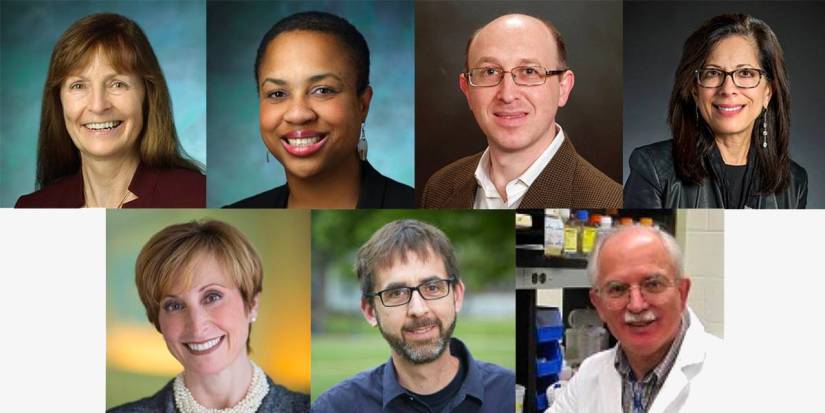Seven Johns Hopkins University researchers are among 564 distinguished scholars elected to the newest class of fellows of the American Association for the Advancement of Science, or AAAS, the world's largest general scientific society. Fellows are selected annually for their contributions to their respective fields and the body of science as a whole.

Image caption: Clockwise from top left: Deborah Jean Andrew, Namandjé N. Bumpus, David P. Goldberg, Elizabeth Marion Jaffee, William W. Wright, Marc Ostermeier, and Sabra L. Klein
The 2021 class of fellows will be recognized during a virtual induction ceremony on Feb. 19 at the AAAS annual meeting.
The AAAS fellows from Johns Hopkins are:
Deborah Jean Andrew – Biological sciences
Deborah Andrew is a professor of cell biology at the Johns Hopkins University School of Medicine and associate director for faculty development for the Institute for Basic Biomedical Sciences. As a professor of cell biology, she has explored animal models of how cells form and specialize epithelial tubular organs, including the salivary glands and the trachea. In addition, Andrew and her research team are studying mosquito salivary gland biology, with the goal of developing strategies to limit transmission of malaria and other insect-borne diseases. Andrew is recognized for contributions to the field of developmental biology, particularly for enhancing our understanding of organ specification, and the morphological and physiological specialization of epithelial secretory organs.
Namandjé N. Bumpus – Pharmaceutical sciences
Namandjé N. Bumpus is a professor and director of the Department of Pharmacology and Molecular Sciences at the School of Medicine. Her scientific research focuses on drug metabolism and the application of state-of-the-art mass spectrometry approaches to understanding molecular pharmacology. Additionally, Bumpus is an advocate for social justice, equity, and anti-racism in science. She is recognized for distinguished contributions to the field of drug metabolism and the translation of studies on drug metabolism in vitro to the prediction of in vivo metabolism of drugs in humans.
David P. Goldberg – Chemistry
David Goldberg is a professor in the Department of Chemistry in the Krieger School of Arts and Sciences. His research focuses on employing synthetic inorganic chemistry to answer fundamental questions regarding structure, spectroscopy, and reactivity pertinent to bioinorganic chemistry. Goldberg is recognized for distinguished contributions in inorganic and bioinorganic chemistry, particularly for modeling the structures and reactivity of metalloenzyme active sites and development of transition metal mediated small molecule activation and catalysis.
Elizabeth Marion Jaffee – Medical sciences
Elizabeth Marion Jaffee is a professor of oncology at the School of Medicine and is also the inaugural director of the new Johns Hopkins Cancer Convergence Institute, which aims to marry emerging technologies with computational biology and cross-train scientists in biology and data science. Jaffee leads a National Institutes of Health-funded laboratory dedicated to developing novel therapies for pancreatic cancer, and has more than 200 peer-reviewed publications. Her scientific leadership roles include mentorship of junior faculty, graduate students and postdoctoral fellows. Jaffee is recognized for her research on pancreatic cancer, particularly characterizing the tumor microenvironment, and her significant advances in developing an effective immunotherapy.
Sabra L. Klein – Medical sciences
Sabra Klein is a professor in the Department of Molecular Microbiology and Immunology at the Bloomberg School of Public Health. Klein, who earned her PhD in psychology from the Krieger School in 1998, studies sex differences and the effects of pregnancy on immune responses to viruses, including influenza viruses and SARS-Cov-2, and vaccines. She is recognized for distinguished contributions to the field of sex differences in immune function, virology, and vaccine efficacy, as well as for her service to related professional societies.
Marc Ostermeier – Biological sciences
Marc Ostermeier is a professor in the Department of Chemical and Biomolecular Engineering in the Whiting School. Known for his work in protein engineering, synthetic biology, and protein evolution, Ostermeier is a former vice chair of his department and is a faculty member of Johns Hopkins' Chemistry-Biology Interface Program and the Program in Molecular Biophysics. He is recognized for outstanding contributions to the principles of natural evolution, protein engineering, directed evolution, and protein evolution.
William W. Wright – Medical sciences
William W. Wright is a professor emeritus in the Department of Biochemistry and Molecular Biology in the Johns Hopkins Bloomberg School of Public Health. Wright's laboratory studies cell-cell interactions that underlie the formation and function of the male gamete. Wright is recognized for distinguished contributions to the field of male reproductive biology, particularly for paracrine regulation of germ cell development and homeostasis, and for outstanding teaching and mentorship contributions.
AAAS was founded in 1848 and includes more than 250 affiliated societies and academies of science, serving 10 million individuals. The nonprofit AAAS is open to all and fulfills its mission to "advance science and serve society" through initiatives in science policy, international programs, science education, public engagement, and more.
Posted in Science+Technology, University News
Tagged aaas fellows







